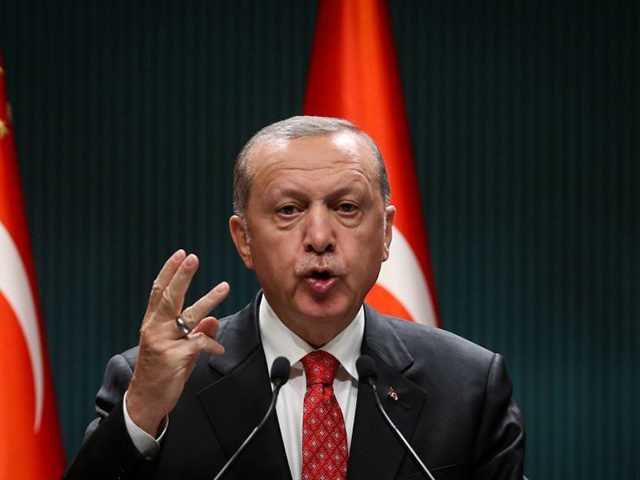Turkey’s Islamist President Recep Tayyip Erdogan marked four years since he overcame a military coup attempt with a concert at his lavish presidential complex on Wednesday and thousands of planned events nationwide.
Turkish military leaders announced the end of Erdogan’s reign in the late hours of July 15, 2016, taking over the streets of Ankara and Istanbul and announcing they had acted to restore secularist rule in the country. Erdogan responded by urging his supporters to take the streets and fight their own military — a call enough people answered to subdue the uprising. Erdogan officials confirmed over 200 deaths and thousands of injuries in the incident.
Erdogan’s government blames Islamic cleric Fethullah Gülen, who resides in self-imposed exile in Pennsylvania, for organizing the coup. Gülen has repeatedly denied any involvement and Turkish officials have failed to put together enough evidence to convince the United States of his involvement, preventing his extradition. A statement from coup organizers on the night of July 15 suggests they were not members of Gülen’s “Hizmet” movement, but secularist soldiers dissatisfied with Erdogan’s Islamist impositions on the country.
Erdogan has since branded July 15 “Democracy and National Unity Day” and organized annual events to honor the “martyrs” that ensured his rule would go on, perpetuating itself through elections opposition leaders have denounced as fraudulent. The 3,000 events Ankara has planned nationwide this year will defy social distancing guidelines aimed at preventing the continued spread of the Chinese coronavirus, fueling a pandemic that has infected nearly 215,000 people in Turkey at press time. The nation has documented 5,402 deaths.
The Islamist Turkish newspaper Yeni Safak, which vocally supporters Erdogan, applauded the government’s “special concert” featuring “a piece by world-famous Turkish pianist Fahir Atakoglu composed to honor the national struggle on the night of July 15 four years ago.” The piece performed reportedly consisted of “chapters” detailing the events of the failed coup.
Erdogan himself partook in a ceremony earlier Wednesday to lay flowers at a monument to those killed fighting to keep him in power during the failed coup attempt.
“Sometimes, a single hero changes the fate of the whole nation. On July 15, millions of heroes emerged from all corners of our country and left a mark on the nation’s future,” Erdoğan said in remarks Wednesday following the flower laying ceremony. “If they had been strong enough, you can be sure that they would not have hesitated to kill notably the country’s president and prime minister and all other elected executives.”
Erdogan’s spokesman Ibrahim Kalin issued a more combative statement Wednesday against the West, accusing Europe and America in an interview of not sufficiently opposing the coup.
“We were disappointed, and it was hard for us to understand that some countries in Europe and other places instead of taking measures against the terrorists themselves were criticizing the [Turkish] government for taking measures against FETO [Gülenist] terrorists,” Kalin alleged, complaining that foreign governments have rejected many Turkish extradition requests. “To this day, four years after the coup, unfortunately, some key allies in NATO and Europe including the U.S. continue to fail to understand the gravity of what happened and why we had to take measures.”
“FETO terrorists in Western countries still continue to present themselves as a peaceful religious charity and educational institution … It is no excuse to say that they [FETO] aren’t breaking any laws in our country,” Kalin added. “You wouldn’t allow al-Qaeda or Daesh sympathizers or operatives or terrorists just because they give the appearance that they aren’t breaking the law in your country.”
Turkish officials reiterated this week that they are seeking over 300 extradition requests all around the world for alleged Gülenists who participated in the failed coup, including 156 people in America.
American officials have repeatedly noted that Turkey has failed to offer evidence linking these individuals, including Gülen, to the coup. In 2017, reports surfaced that Interpol had locked Turkish officials out of its system for demanding tens of thousands of frivolous “red notices,” or requests for the arrest of, alleged Gülenists. Interpol later denied the reports.
Turkish officials rapidly detained, imprisoned, fired from public jobs, and otherwise penalized over 100,000 people — many judges, teachers, and other public servants — in the aftermath of the coup for alleged support of Gülen. On Wednesday, Defense Minister Hulusi Akar claimed that Turkey had “neutralized,” a term Ankara uses to mean killed or arrested, over 17,000 alleged “terrorists.”
The organizers of the coup have never publicly allied themselves with Gülen. At the time of the incident, people claiming to represent the new government of Turkey called themselves the “Turkish Peace Council” and issued a statement asserting they would “reinstate constitutional order.”
“Turkish Armed Forces have completely taken over the administration of the country to reinstate constitutional order, human rights and freedoms, the rule of law and general security that was damaged. All international agreements are still valid,” the statement read. “We hope that all of our good relationships with all countries will continue.”
Hours later, Erdogan would appear on Facetime from an undisclosed location disputing the claim that the armed forces had won the battle and urging supporters to fight back.

COMMENTS
Please let us know if you're having issues with commenting.